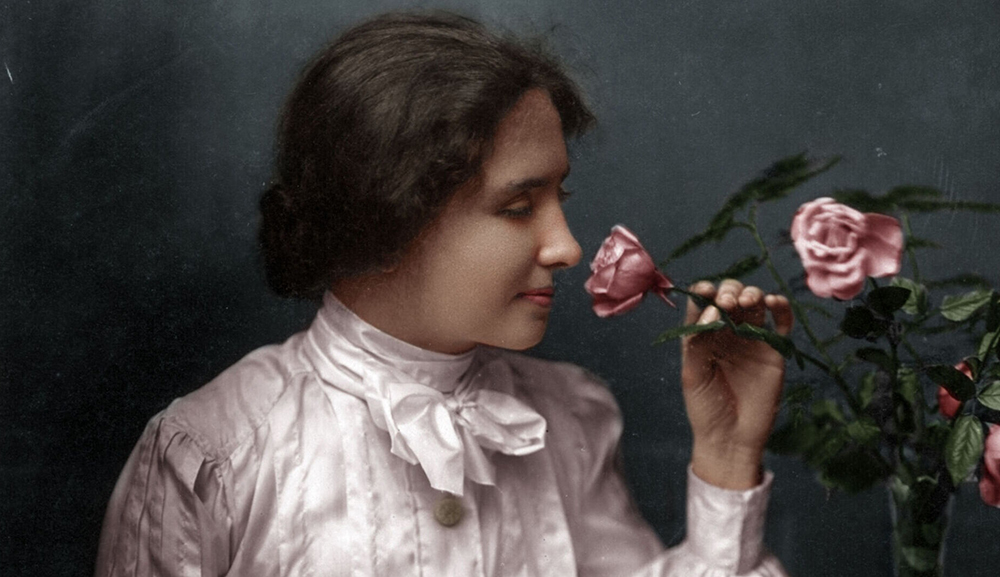Have you ever imagined what it must feel like to be born healthy with all five senses, and then having some of them being taken away due to illness? Well Helen Keller lived through that. Helen Adams Keller was born on June 27, 1880 in Tuscumbia, Alabama. Keller was born with her senses of sight and hearing, and started speaking when she was just 6 months old. She started walking at the age of 1.

In 1882, however, Keller contracted an illness—called "brain fever" by the family doctor—that produced a high body temperature. Within a few days after the fever broke, Keller's mother noticed that her daughter didn't show any reaction when the dinner bell was rung, or when a hand was waved in front of her face. Keller had lost both her sight and hearing. She was just 18 months old.
As Keller grew into childhood, she developed a limited method of communication with her companion, Martha Washington, the young daughter of the family cook. The two had created a type of sign language, and by the time Keller was 7, they had invented more than 60 signs to communicate with each other. In 1886, Keller and her parents visited the Perkins Institute for the Blind in Boston, Massachusetts. There, the family was introduced to one of the institute's most recent graduates, Anne Sullivan. And so began a 49-year relationship between teacher and pupil.
In March 1887, Sullivan began by teaching Helen finger spelling, starting with the word "doll," to help Keller understand the gift of a doll she had brought along. At first, Keller was curious and then defiant, refusing to cooperate with Sullivan's instruction, yet Sullivan kept working at it, encouraging Helen to go through the regimen.
In a dramatic struggle, Sullivan taught Keller the word "water"; she helped her make the connection between the object and the letters by taking Keller out to the water pump, and placing Keller's hand under the spout. While Sullivan moved the lever to flush cool water over Keller's hand, she spelled out the word w-a-t-e-r on Helen's other hand. Keller understood and repeated the word in Sullivan's hand. By nightfall, she had learnt 30 words!! In 1890, Keller began speech classes at the Horace Mann School for the Deaf in Boston. She toiled for 25 years to learn to speak so that others could understand her. As her story became known to the general public, Keller began to meet famous and influential people. One of them, Henry H. Rogers, a Standard Oil executive was so impressed with Keller's talent, drive and determination that he agreed to pay for her to attend Radcliff College. There, she was accompanied by Sullivan, who sat by her side to interpret lectures and texts.
By this time, Keller had mastered several methods of communication, including touch-lip reading, Braille, speech, typing and finger-spelling. Keller then wrote her first book: The Story of My Life. After college, Keller set out to learn more about the world and how she could help improve the lives of others. She became a well-known celebrity and lecturer by sharing her experiences with audiences, and working on behalf of others living with disabilities.
Throughout the first half of the 20th century, Keller tackled social and political issues, including women's suffrage, pacifism and birth control. In 1915, along with renowned city planner George Kessler, she co-founded Helen Keller International to combat the causes and consequences of blindness and malnutrition. In 1920, she helped found the American Civil Liberties Union.
Between 1946 and 1957, she traveled to 35 countries on five continents. In 1955, at age 75, Keller embarked on the longest and most grueling trip of her life: a 40,000-mile, five-month trek across Asia! Through her many speeches and appearances, she brought inspiration and encouragement to millions of people. We should all learn from Keller that you can do anything you strive for, as long as you don't give up. There's also a fundamental reason why Keller could reach the places she did: her beloved teacher. Teachers are our gurus and must be treated with the utmost respect and kindness. The gift of knowledge that they bestow is unparalleled to any other.
During her lifetime, she received many honors in recognition of her accomplishments. Keller died in her sleep on June 1, 1968, just a few weeks before her 88th birthday. During her remarkable life, Keller stood as a powerful example of how determination, hard work, and imagination can allow an individual to triumph over adversity. By overcoming difficult conditions with a great deal of persistence, she grew into a respected and world-renowned activist who labored for the betterment of others.